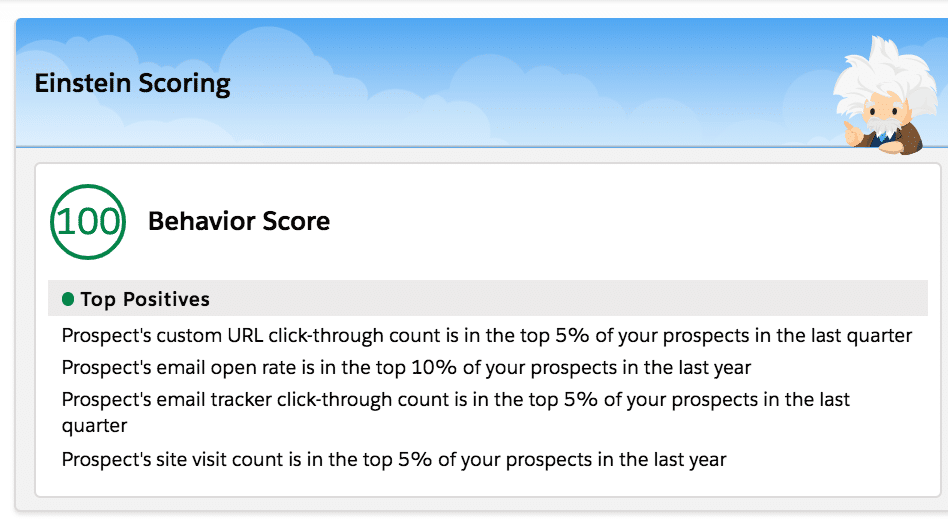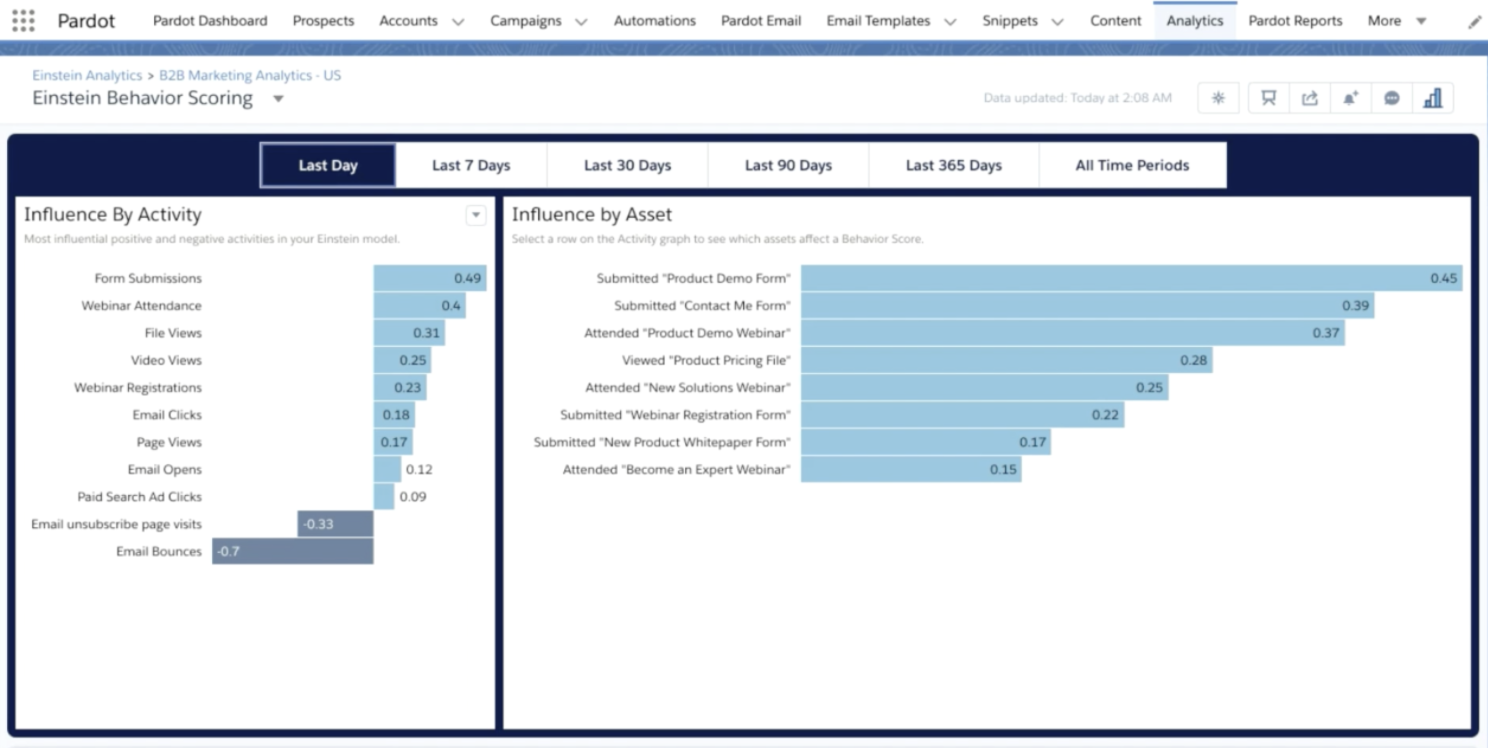Einstein Behavior Scoring is an intuitive tool created to help your company effectively close more deals. This feature allows sales representatives to have a clear view of each prospect and their overall likelihood of purchasing what products or services your company has to offer.
What is Einstein Behavior Scoring?
Einstein Behavior Scoring is a tool within Salesforce and Pardot that helps identify the ideal potential sales targets for sales representatives so they can concentrate their efforts on a specific prospect whose behavior suggests that they are ready to buy. The Behavior Score is generated based on the system’s evaluation of the prospects engagement activity and identifies successful, positive trends in the prospect’s behavior which reflects their likelihood to convert to a sale. These scores are represented in the numbers 0-100. The higher the number, the more likely the prospect is to convert to a sale. this score also reflects how that particular prospect compares to all the others in your database.

This model helps sales representatives prioritize not only the prospects who are more likely to buy but also help sales representatives determine what efforts they should be concentrating on for each particular prospect. These insights allow sales representatives to be as efficient and successful as they can be, helping streamline not only your companies progress, but also enhance the customer experience. More knowledgeable sales representatives provide more confident and concise customer service.
How does it work?
Einstein Behavior Scoring uses machine learning to uncover the most influential behavior patterns and signals across a prospects past and current engagements. Einstein Behavior Scoring uses the data collected from their engagement patterns and updates the model over a period of time. Information such as frequency and even the amount of time since the last activity is collected, weighed and defined- which results in the overall score for that prospect. The higher the score, the higher the likelihood of a sale.
Einstein Behavior Scoring uses machine learning to identify the unique engagement patterns prospects show that signal the likelihood of closing an opportunity with them. This unique pattern is represented as a score (0-100), which is developed from the prospect’s behaviors such as how many emails they have opened, how many forms they have submitted, or how many videos they have viewed and when. Not only does Einstein learn the significance of each type of action in closing an opportunity, but it also learns the importance of engaging specific marketing tools and the timing of each engagement.
For example, an organization could be set up the model to determine that if a prospect viewed an email that was sent last week, that data would result in a higher score than if their last opened email was months prior. This unique scoring model will help guide sales representatives to put more time and effort into the prospects that have had more recent activity and are therefore showing an active interest in your product, rather than wasting valuable time following up with clients who have not been recently engaged and could have possibly never been serious about making a purchase in the first place. Because of this intuitive data analysis, a prospect’s score can be ever-changing which will result in a more accurate prospect temperature check and appropriate and assured outreach by your sales representatives.
Key things to note
When initiating Einstein Behavior Scoring in your Salesforce environment, there are a few things to keep in mind. First, this tool is activated under “Marketing Setup” which can be found when clicking the gear icon in your database. Just search “Einstein” in the search box. To turn on Einstein Behavior Scoring, you will need to have a Pardot Administrator Role with Sales Cloud User, Service Cloud User, or CRM User permission set. It can take up to 48 hours for your prospect’s scores to become available after Einstein Behavior Scoring is activated. The scoring model works best when there is at least six months of data in your system for the prospect, along with at least 20 prospects linked to opportunities in your system. Prospect scores are updated about every 4 hours, but the more data you have in your system, the longer it can take for prospect scores to refresh and update.
After Einstein Behavior Scoring is initiated in your system, the model learns from the prospect activities and their relationships found in your data. It is important to know that prospects associated with any opportunities in the system that were created before you enabled Einstein Behavior Scoring will not be scored. Einstein Behavior Scoring works on prospects that are linked to leads and contacts in your system. Person accounts are not scored. In the situation where there is a duplicate prospect in your system, scores are not combined. A behavior score is linked to a unique Pardot prospect ID.
Einstein Behavior Scoring Dashboard
To get a visual overview of the prospects in your system and their scores, you can create a dashboard that shows how all of your companies engagements impact Einstein Behavior Scoring. This dashboard is turned on during the setup for the B2B Marketing Analytics app and you must have Pardot Einstein. After Einstein Behavior Scoring is implemented, the dashboard can be added from the Analytics Studio. This dashboard provides a visual of which engagement activities impact your sales opportunities the most.

To set it up in your environment, follow these steps:
- From Marketing Setup, enter Einstein in the QuickFind box, and then select Einstein Pardot.
- Select Einstein Behavior Scoring.
- Enable the feature, and then place the component on the pages where you want to show scores.
- After you begin to get scores from Einstein, open Tableau CRM Analytics Studio from the App Launcher.
- Create an app.
If you already use B2B Marketing Analytics and want to add the Einstein Behavior Scoring dashboard to an app, click Reconfigure in the app header. - On the Optional Features step in the setup wizard, select Einstein Behavior Scoring Dashboard.
- Save the app.
Please note, the dashboard may not automatically begin showing data. It may take some time. As your first start using the dashboard, it will show basic information regarding the Einstein Behavior Scoring model, but as you gather more data in your system, the dashboard will show more detailed information that is gathered from your companies unique marketing techniques.
Getting started with Pardot Einstein Behavior Scoring and need more assistance? Feel free to reach out to us.

Kirby Corbey
Client Success Manager
Kirby is one of our Account Executives at Roycon. She has over 5 years of experience in a client success role within the software industry. She was born and raised in Montana and will continue to live there even though the winters can be pretty tough.
About Roycon
We’re an Austin-based Salesforce Consulting Partner, with a passion and belief that the Salesforce platform’s capabilities can help businesses run more efficiently and effectively. Whether you are just getting started with Salesforce or looking to realize its full potential, Roycon specializes in Salesforce Implementations, Salesforce Ongoing Support, and Salesforce Integrations, and Development. We’re the certified partner to guide the way to increase Salesforce Adoption, make strategic decisions, and build your Salesforce Roadmap for success.